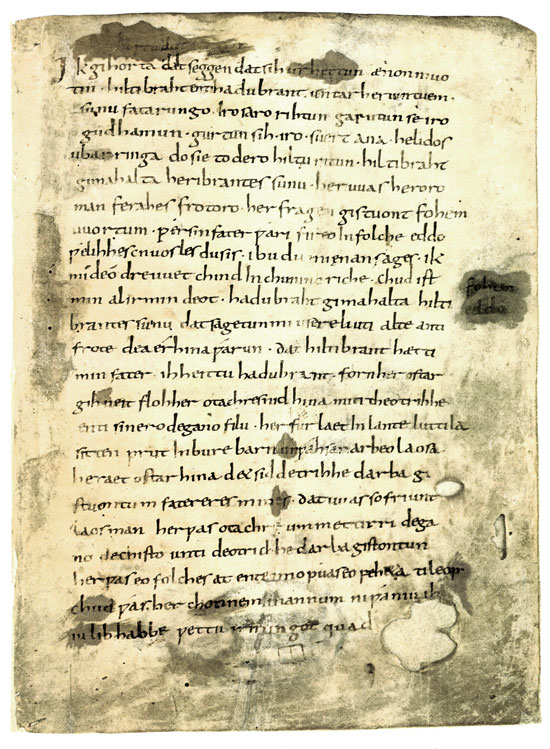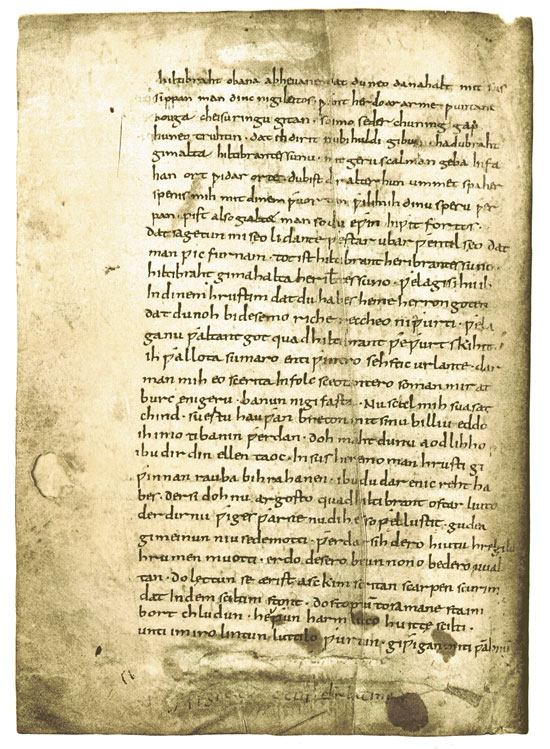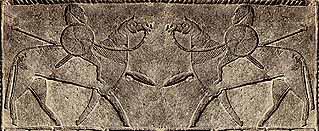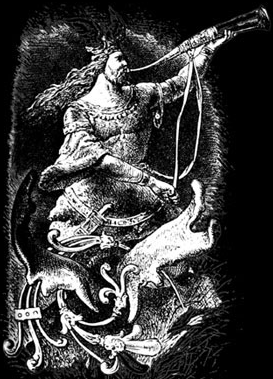Dennies Hildebrand, 445-520, was an elder warrior, a magician, and an adviser and weapons master to the Ostrogothic King Theodoric I “the Great” of Verona (better known as his poetic incarnation Dietrich von Bern in the Nibelungen Saga). He and his son Hadubrand are the heroes of the “Hildebrandslied”, a famous old high German poem.
The Hildebrandslied was composed in alliterative verse during the second half of the 8th century, this poem was recorded in Old High German about 810 a.d. at the Fulda Monastery in southern Germany. The manuscript was used as the binding for a theological treatise. Translated here into free verse. No attempt has been made to reproduce the original meter or alliteration. The poem’s conclusion is lost. Parallel traditions suggest that the father killed his son. A ballad from the 13th century, the so-called “Younger Hildebrandslied,” ends with the father finally killing the son. The five dots indicate that part of the text is missing or unreadable. Two seasons per year times sixty seasons equals thirty years. This was a standard way to reckon time in medieval northern Europe.
Hildebrandslied – English Translation:
“I have heard tell,
that two chosen warriors, Hildebrand and Hadubrand,
met one another, between two armies.
Father and son, the champions examined their gear,
prepared their armor, and buckled their swords
over their chain mail, before riding out to battle.
Hildebrand, the older and more experienced man, spoke first,
asking, with few words who his father was
and from which family he came.
‘Tell me the one, young man, and I’ll know the other,
for I know all great people in this kingdom.’
Hadubrand, the son of Hildebrand, replied:
‘Old and wise people who lived long ago
told me that my father’s name was Hildebrand.
My name is Hadubrand.
Long ago he road off into the East with Dietrich,
and his many warriors, fleeing Otacher’s wrath.
He rode off into the East, leaving his wife at home
with a small child, deprived of his inheritance.
Dietrich, a man with but few friends,
came to rely upon my father.
His feud with Otacher grew more intense,
and my father became his best-loved warrior.
He was at the front of every battle, wanting to be in every duel.
With Almighty God in Heaven for a witness,
may you never go to battle against your next of kin.’
And he took from his arm a band of rings,
braided from the emperor’s gold,
which the King of the Huns had given to him.
‘I give you this in friendship.’
Hadubrand, the son of Hildebrand, replied:
‘A gift should be received with a spear,
point against point.
You are a cunning old Hun,
leading me into a trap with your words,
only to throw your spear at me.
You have grown old by practicing such treachery.
Sailors traveling westward across the Mediterranean Sea
told me that he fell in battle.
Hildebrand, the son of Heribrand, is dead.’
Hildebrand, the son of Heribrand, replied:
‘I see from your battle gear
that you have a good master at home,
and that you have never been banished by your prince.
Alas, Lord God, fate has struck.
Sixty times I have seen summer turn to winter
and winter to summer in a foreign land.
I was always placed on the front lines;
I was never killed while storming a fortress,
and now my own child should strike me with his sword
and hit me with his ax, if I don’t kill him first.
But if you have the courage, you can easily
win the armor from an old man like me,
and take away the spoils, if you have any right to them.
Not even the worst of the men from the East
would turn down the the chance to fight with you,
with your desire to duel. Cost what it may,
let us see who will boast of this gear
and who will lay claim to these two suits of chain mail.’
Then they let sail their ashen spears,
Sharp showers, sticking in their shields.
They came closer on foot, splitting each other’s bright boards,
striking fiercely until their weapons shattered their shields.”


When I was 5 years old, I remember my grand-grandmother telling me the story of our ancestors Hildebrand and Haduband again and again. There where four different versions of the story, and she told me that all four versions are told since the very early days of our family. All of them are important to understand the meaning, she said. The first two are more or less similar to the older and younger Hildebrandslied, while another one ends with the death of Hildebrand, and in the final version they stop the fighting – both actually not really knowing why – and finally separate.” (E.M. Hildebrandt, 1905-1991)
http://www.usd.edu/eric/deutsch/literatur/projekt/works/hildebrandslied.html (english)
http://www.pitt.edu/~dash/hildebrand.html (english)
http://hub.ib.hu-berlin.de/~hab/arnd/Start.html (german)
http://www.zum.de/Faecher/D/Saar/gym/ahdtext.htm (german)
http://www-gewi.kfunigraz.ac.at/deuph/lv/ss97/schwob/d3.htm (german)
http://www.mythen-lexikon.de/Hildebrandslied.htm (german)
Dennies Hildebrand is also mentioned in several other medieval sources (I.e. Nibelungenlied and Heimskringla).

